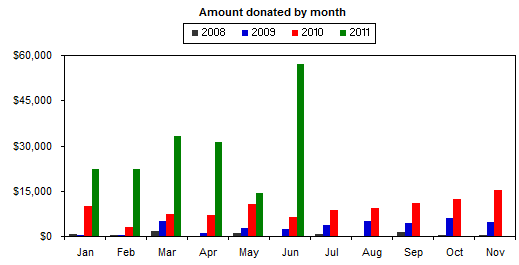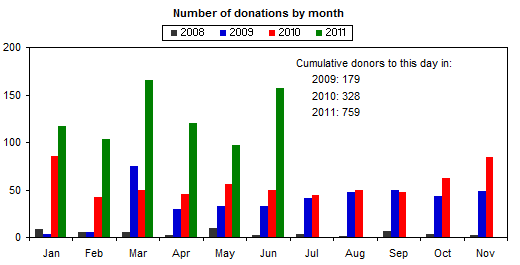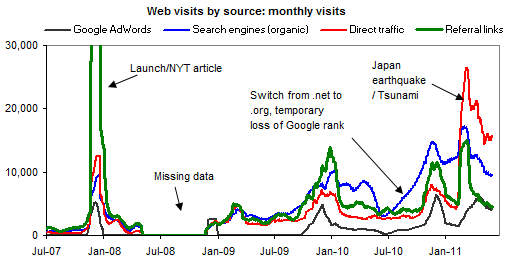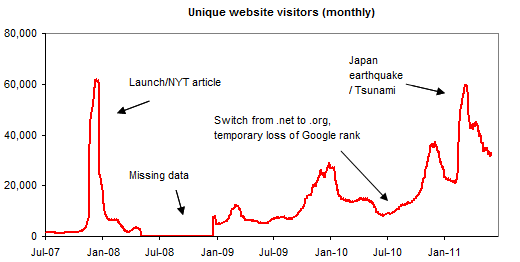KIPP is one of the most well-known and, we believe, effective charities in the United States: it has a long track record of improving students’ performance in school and Secretary of Education Arne Duncan has cited it as a model for education reform. In our recent analysis of KIPP, we’ve been surprised to learn that despite these accolades, some KIPP schools are considering cuts to core parts of the program (such as reducing Saturday school and the number of teachers available for after-school activities) and are being forced to significantly slow down the opening of new schools. KIPP Houston requires approximately $1.4 million to prevent these cuts and could use an additional $12-13 million productively to fund opening 3 new schools.
How does such a successful and acclaimed organization struggle to raise the funds necessary to continue expanding? We think a big part of the explanation comes down to the fact – which we’ve discussed before at length – that the issue of “room for more funding” (the question of how additional funding would affect a charity’s activities – i.e., the impact of the marginal donation, as opposed to the average one) is neglected by givers.
We came across the close to $15 million funding gap at KIPP Houston by probing the “room for more funding” situation for the KIPP Foundation, the national organization that we have been directing donors to. In the course of conversations on this topic, we ended up agreeing with KIPP representatives that
- The KIPP Foundation itself doesn’t have short-term “room for more funding”: it is committed to executing against its Board approved budget only. This does require a significant amount of philanthropic funding annually, but current needs pertain to future years.
- Specific KIPP regions do have room for more funding – and the KIPP Foundation doesn’t generally give grants to these regions (doing so isn’t in its model). The KIPP Foundation directed us to KIPP Houston as a specific KIPP region with a funding gap and capacity to expand.
Bottom line:
- One of the most acclaimed and effective programs in U.S. education needs $1.4 million to avoid cutting core programs and an additional $12-13 million to continue its expansion.
- This fact highlights the benefits of deeply analyzing “room for more funding,” something we’ve seen very little discussion of elsewhere in the context of charitable giving.
Details follow. (Note that we still recommend international aid organizations above U.S. organizations; this analysis is most relevant for donors who wish to focus on the U.S.)
Donors who want to support KIPP Houston directly can do so using our donate page for KIPP Houston.
Background
Over time, we’ve put more and more time and thought into the question of how to analyze a charity’s “room for more funding”, i.e., the question of how additional funding would affect a charity’s activities.
- For the early years of our project, our analysis was loose and conceptual, as we looked at basic heuristics.
- In December 2009, working with our top-rated charity VillageReach, we arrived for the first time at what we considered a “gold standard” room for more funding analysis, showing specifically how VillageReach would change its plans in response to different levels of total unrestricted revenue.
- During 2010, we started revisiting our recommended charities looking for a similar level of understanding. One of the first charities to provide it was our top-rated U.S. charity, the Nurse-Family Partnership (NFP). NFP told us that existing commitments can sustain the organization through 2015 at which point the organization would likely need additional donations to continue operations.
We believe that donations to NFP are good: they provide a long-term safety net to an outstanding organization, and they support the cause of more effective and accountable charity more broadly. Nevertheless, we don’t think it’s fair to consider donations to NFP, today, to be the best option if there are other organizations that would use them to fill a more pressing need.
- The Knowledge Is Power Program (KIPP) is another U.S. charity we rate highly, and in response to KIPP’s question about how it could improve its rating, we responded that we’d like the best possible understanding of its room for more funding. KIPP Foundation representatives agreed to this and were extremely helpful. They were open that while the KIPP Foundation does not have the same type of long-term funding commitments that NFP has, and does require a significant amount of philanthropic funding annually, it does not have a compelling use for additional funds in the short term. But, the KIPP Foundation went on to clarify that, some of the regional networks (i.e., the actual KIPP schools) in the KIPP family do have pressing, if not urgent, financial needs.
The KIPP Foundation does not have a mandate to directly fund KIPP schools. (For more on what it does, see our review of KIPP.) The KIPP Foundation told us that some of the regional networks have significant room for more funding. The KIPP Foundation referred us to KIPP Houston, which it believed could significantly benefit from additional funding.
KIPP Houston’s Room for More Funding needs as of July 2011
Based on this lead, we reached out to KIPP Houston, and in speaking with John Murphy, KIPP Houston’s CFO, it became apparent that it has a significant and immediate need for more funding. Specifically, KIPP Houston, which relies on money from the state for close to 85% of its annual operating budget, is planning for expected state budget cuts of 6% for the coming school year and 8.5% the following year, which would leave it with a budget shortfall of 4.7 million for the coming year.
Two notes on the data:
- The actual deficit would be slightly lower in the upcoming year and slightly higher in the subsequent year, but the average deficit over the 2 years is $4.7 million and our understanding is that KIPP would (we believe appropriately) budget for the two years together.
- We are relying heavily on KIPP Houston’s expectations for future state cuts. A two-year state budget cut of $4 billion has been passed by the legislature and according to a recent newspaper report (archived), a 6% cut across the board is expected in year one, while the subsequent year’s cut has not yet been allocated across schools, and we do not know when that will occur.
KIPP Houston told us that it expects to be able to raise an additional $1.7 million in donations (relative to what it had previously planned, a 50% increase from the previous year) and that it hopes to save $0.4 million by finding areas of potential savings (through operational efficiencies, etc.), thereby filling around $2.1 million of the funding gap itself. It could also use $1.2 million in bond income to fill the gap, though KIPP Houston told us that this would reduce its ability to expand in the near term because it had intended to put these funds toward expansion.
The remaining gap, estimated at $1.4 million, would need to be addressed through some combination of spending cuts to some of the items listed below; the final decision has not yet been made.
| Expense | Maximum amount |
|---|---|
| “KIPP Unique” Expenses – These include program areas such as, Field Lessons, KIPP Time (extended day) and Saturday school. Specific changes in this area will be left up to the discretion of school leadership. | $2.4 million |
| Putting a hold on the teaching fellows program (resulting in the replacement of fellows with teacher aides). Specific changes in this area will be left up to the discretion of school leadership. | $0.5 million |
| Freezing administrative hiring for expansion of KIPP Houston’s network. | $0.75 million |
| Reducing employee compensation plans, professional development and/or benefits packages. | $0.75 million |
We asked KIPP Houston what it would do if it were able to raise additional dollars above and beyond its new fundraising goal (and close some of the gap). Mr. Murphy indicated that since many aspects of the state budget are still up in the air, these decisions have not been finalized, but were KIPP Houston able to raise additional dollars towards its budget shortfall, it would likely reinstitute “KIPP Unique” expenses and employee compensation, benefits and professional development packages first (with much of the details left to the discretion of campus directors), items we see as core to KIPP’s operations. In addition, this tightening of their budget and the use of bond income also means slowing down expansion plans in the Houston area, resulting in fewer students being served by the KIPP program than intended. Mr. Murphy explained:
“We recently were able to purchase property for our 24-26th schools and it is literally right in the heart of our more than 7,000-student waiting list. We could start things up there right away, but right now we can’t afford the construction because our capital is minimized. Those three schools could serve approximately 1,600 kids, but right now we just have to hold off and wait.”
Conclusion
As we’ve written, even a charity with proven impact isn’t necessarily a good investment – a key question is the impact of the marginal donation (not just the average one). For years we’ve recommended the Nurse-Family Partnership and the KIPP Foundation to U.S.-focused donors based on their strong case for impact, but as our analysis of “room for more funding” has sharpened, we’ve discovered that neither has a short-term need for more donations – and this in turn led us to find a specific KIPP network (KIPP Houston) that does have short-term room for more funding. (Note that we still recommend international aid organizations above U.S. organizations; this analysis is most relevant for donors who wish to focus on the U.S.).
While donating to the Nurse-Family Partnership or the KIPP Foundation does mean supporting an outstanding organization that relies on philanthropic donations to operate – and therefore is making a positive impact – we think there is a huge opportunity for a U.S.-focused donor to support organizations like KIPP Houston, for which more funds will make the difference between expansion and cutbacks.
Now the question is, how much of that nearly $15 million funding gap can we help close?
Donors who want to support KIPP Houston directly can do so using our donate page for KIPP Houston.




